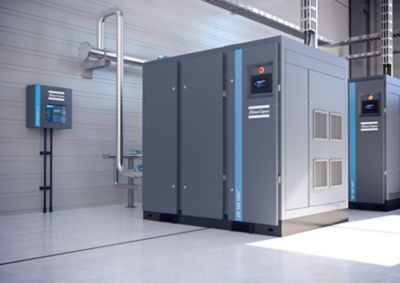Transforming Cement Production with Air Compressors Innovation
October 2, 2024
Cement is a chemical substance used as a binder in building and civil engineering construction. It’s production, however, is a complex and energy-intensive process that requires precision and efficiency at every stage. Air compressors hold an important role in ensuring the smooth operation of cement plants by powering various systems, equipment, and processes.
The continuous movement of the cement powder is essential when producing cement to prevent it from forming clumps. We range of offering provides the power needed to transport materials throughout the cement-making process, while also powering tools designed to endure the hash demands of the industry. With a full range of options available, we ensure you get the best solution to support the unique demands of your applications.
The cement industry is a vital component of global infrastructure development, providing the building blocks for our roads, bridges, and buildings. It's a sector that relies heavily on industrial machinery and processes to ensure efficient production. Among these crucial tools is the air compressor which plays a pivotal role in cement manufacturing.
The Basics of Cement Production
Before we explore the role of air compressors in this industry, let's briefly examine how cement is manufactured. Cement production is a complex process that involves various stages including: raw material extraction, grinding and blending, preheating, kiln firing, clinker formation, cooling, pulverization and the final packaging of cement.
The Role of Air Compressors
- Pneumatic Conveyance: Cement production begins with raw materials like limestone, clay, and gypsum which must be transported and managed with precision. While manual labor and mechanical systems have traditionally been used for this task, air compressors bring a modern, efficient touch to the process.
One of the most critical functions of a compressed air system in the cement industry is pneumatic conveyance. Compressed air is used to transported raw materials from storage silos to various stages of the production, offering a highly efficient solution that minimizes the risk of material contamination.
- Blending and Homogenization: In cement production, it's crucial to ensure that the raw materials are well-mixed and homogenized to maintain product consistency. Air compressors are used to operate air cannons that help dislodge materials stuck in storage silos, ensuring a steady and uniform flow.
- Combustion Air: The cement manufacturing process requires high-temperature kilns to produce clinker. Air compressors provide the necessary oxygen for combustion, ensuring precise temperature control inside the kilns, which directly impacts the quality of the clinker.
- Dust Control: Cement plants are inherently dusty, with fine particles created during material handling and grinding. Managing this dust is crucial as it poses several challenges for both worker safety and environmental compliance. Air compressors are used to power dust control systems that capture and filter airborne particles, improving air quality and reducing equipment maintenance.
- Instrumentation and Control: Modern cement plants rely on sophisticated instrumentation and control systems. Air compressors are often used to provide compressed air for operating pneumatic control valves, actuators, and instruments that help regulate various processes.
Efficiency and Sustainability
As the push for sustainability grows and reducing carbon emissions, the cement industry is also under pressure to adopt greener practices. Air compressors play a role in this effort by offering opportunities for energy efficiency improvements. For instance, variable-speed drive compressors can adjust their output to match the demand, reducing energy consumption during periods of low usage.
Moreover, the use of renewable energy sources to power air compressors can further reduce the carbon footprint of cement production. By integrating solar or wind power into the compressor system, cement plants can reduce their reliance on fossil fuels.
In the world of cement production, air compressors keep the industry running smoothly. From transporting raw materials to controlling dust and ensuring efficient combustion, these versatile machines play a pivotal role in the manufacturing process. So, the next time you see a sturdy cement structure, remember that it owes a part of its existence to the trusty air compressor.

